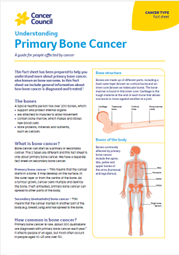- Home
- Primary bone cancer
- Treatment
Primary bone cancer treatment
The treatment of primary bone cancer is complex and requires specialist care.
Learn more about:
- Overview
- Specialist treatment centres
- Preparing for treatment
- Surgery
- Chemotherapy
- Radiation therapy
Overview
Research shows that having treatment at a specialist treatment centre (see below) means better recovery and longer survival.
Treatment will depend on:
- the type of primary bone cancer
- the location and size of the tumour
- whether or not the cancer has spread
- your age, fitness and general health.
Primary bone cancer is usually treated by surgery, chemotherapy or radiation therapy, or a combination of those. The aim is to control the cancer and maintain the use of the affected area of the body.
Many people who are treated for bone cancer go into complete remission (when there is no evidence of active cancer).
Specialist sarcoma treatment centres
You can find specialised sarcoma treatment centres at certain hospitals and cancer centres in major cities throughout Australia.
These specialist centres have multidisciplinary teams (MDTs) who regularly manage this cancer. The team will include surgeons, medical oncologists, radiation oncologists, pathologists, radiologists and clinical nurse consultants. It will also include allied health professionals such as physiotherapists, occupational therapists and social workers. Some centres also have oncologists with experience in treating children and young people with bone cancer.
To find a specialised sarcoma team in your state or territory, visit sarcoma.org.au. You might have to travel for treatment.
Preparing for treatment
Ask about fertilityTreatment may affect your ability to conceive a child (fertility) Before treatment starts, you may be able to store sperm, eggs, embryos, or ovarian tissue. Learn more about fertility and Cancer. | |
Avoiding fracturesIf your doctor thinks you may be at risk of bone fracture, they may recommend you wear a splint to support the bone or use crutches. | |
Checking heart and kidneysYour doctor may recommend you have some tests to check how we your heart and kidneys are working, as some types of chemotherapy and radiation therapy may affect these organs. |
Podcast: Making Treatment Decisions
Listen to more episodes from our podcast for people affected by cancer
All updated content has been clinically reviewed by Prof Peter Choong AO, Orthopaedic Surgeon, and Sir Hugh Devine Professor, St Vincent’s Hospital, and Head of Department of Surgery, The University of Melbourne, VIC. This edition is based on the previous edition, which was reviewed by the following panel: Prof Peter Choong AO (see above); Catherine Chapman, Adolescent and Young Adult and Sarcoma Cancer Specialist Nurse, Division of Cancer and Ambulatory Support, Canberra Hospital, ACT; A/Prof Paul Craft AM, Medical Oncologist, Canberra Hospital and Australian National University, ACT; Belinda Fowlie, Bone Tumour Nurse Practitioner Candidate, SA Bone and Soft Tissue Tumour Unit, Flinders Medical Centre, SA; Prof Angela Hong, Radiation Oncologist, Chris O’Brien Lifehouse, and Clinical Professor, The University of Sydney, NSW; Vicki Moss, Nurse Practitioner, SA Bone and Soft Tissue Tumour Unit, Flinders Medical Centre, SA; A/Prof and Dr Marianne Phillips, Paediatric and Adolescent Oncologist and Palliative Care Physician, Perth Children’s Hospital, WA; Chris Sibthorpe, 13 11 20 Consultant, Cancer Council Queensland; Stephanie Webster, Consumer. We would also like to thank the health professionals and consumers who have worked on previous versions of this information.
View the Cancer Council NSW editorial policy.
View all publications or call 13 11 20 for free printed copies.
